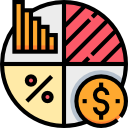Smart things you can do for your finances right now !!

We are living in unprecedented tough times. In the middle of a pandemic, let's shift our focus to some of the positive aspects. Today, we have extra time, and I think we can make the best use of this by spending time with our family, revisiting our hobbies, exercising for a healthy body and mind, sorting out our money matters and many more things which we always wished for in our routine life.
Being an adviser, I feel we can make good use of this time by reviewing our risk or insurance, emergency fund, financial goals, asset allocation, strategy, and investments and plan our financial journey to meet our financial goals and objectives.
Check your medical insurance
First thing you can check if you have adequate insurance like medical and life insurance. If you don't have personal health and life cover for you and your family, you should buy one right away amid this virus spread. If you already have one, we suggest you check if you have enough coverage.
I always recommend buying your own medical policy even if you are covered by your office. Along with your farewell party, you bid farewell to your medical cover from work. Companies are reluctant to cover older people and for older people with pre-existing conditions, the reluctance is even stronger. Of course, if you are covered with government agencies even post-retirement, you don't need a medical cover. However, at times like this isn't having, a cover is lethal because jobs and companies are at a high-risk zone. You don't want to land up in an unusual situation where you neither have a job nor health cover.
If you already have medical insurance, check if you have adequate coverage which depends on where you live, what kind of hospitals you want to go and what kind of privacy concerns you have and if you are over sixty years old you can go for a top-up plan to bump up your basic cover.
Check your life insurance
The right reason to buy life insurance is to protect your family if you die a premature death. When we die, we leave many things midway hence it's important to secure your family's future by buying adequate life insurance. At times like this one should check if their cover, sum assured is good enough for their family security and future.
The big question here is, how much cover you need?
Well going by the rule of thumb, you may need eight to ten times of your take-home annual income or 15-20 times of your annualized monthly expenditure. To cover your income, you may need to buy an additional insurance for all the debt you carry.
A pure life insurance policy is called a "term plan". The premium you pay for term plans is cheaper as compared to other life insurance products usually a bundled product i.e. combination of insurance and investment which neither gives you good cover nor returns and you end up paying a higher premium.
Understand, the price of pure life cover should be the same for term plan and other life insurance policy. It cannot be different for the same person as the price of life cover is calculated based on average life span, gender, current age, etc. Now Let's compare the pricing of a term plan and an endowment plan to understand this further.
If your annual take-home salary is Rs 6 lakhs and your current age is 35, going by the thumb of rule you need coverage of at least Rs 60 lakhs. If the premium of Rs 4000 a year buys 20 years in a term plan, then the cost should be the same in the endowment plan of the life cover, right?
However, you may end up paying Rs 35,000 a year premium in a bundled product, just Rs 4,000 is going towards your life cover with doesn't even give adequate life coverage to protect your family and rest is your investment which generates returns lower than a liquid mutual fund or Fixed deposit.
The day I understood this. I prefer to unbundle my investments from my insurance and stay with a large term plan to cover my risk and invest in equity, mutual funds, etc. for my investments.
Emergency Fund
An emergency fund is created during good times but unfortunately, most of us only appreciate the need for an emergency fund when we have to deal heads on with the situation.
Remember, you cannot create emergency funds during the time of emergency. As the world is slipping into recession, you may soon see defaults, job loss, pay cuts and delay in salary pay-out, so one should always be well prepared to deal with such emergencies. The best thing you can do now if you don't have an emergency fund is to cut down on your expenses.
A rough rule of thumb says keep aside 6 months of living cost and you can increase or decrease the amount depends on your personal situation as well. Let's say, if you are a double income household with no dependants and kids, the emergency fund can be reduced to 3 months. On the other end, if you are a sole earner with dependants, spouse, and kids you are better off having up to a year worth of the emergency fund.
Higher the risk, the higher the emergency fund you need to save, and vice versa. You can park your emergency fund in debt mutual funds or Fixed deposit.
As a financial planner, I have come across people who feel that they can use credit cards during an emergency. Rightly so, if you have not utilized your card in full. Also, remember your interest-free period on a credit card is just for a month and a half and eventually, you have to repay your bill. Let's say, you choose to pay the minimum amount due then you may end up paying 30-40% interest on your outstanding amount.
Always remember, your emergency fund is not an investment, it's insurance with one purpose to protect you and your family.
Review your financial goals, asset allocation, and strategy
Perhaps, it's a good time to sit down peacefully with a cup of coffee or tea and think about your financial goals both short-term and long-term and prioritize them. Review your Asset Allocation based on your risk profiling. Understand if there is any shift in your financial goals. If yes, talk to your planner right away. Review your financial strategy and examine what has worked for you and what hasn't and carry out a comprehensive analysis of your portfolio.
Investing
Historically we have always seen after a calamity, war, or incident with such global impact, people and economies have revived.
If anyone is looking to invest with a medium-term view of 3 to 5 years and they have sufficient cash to deal with contingencies, which is at least 6 months of your monthly expense, we think it's a good time to start allocating money to equities in a systematic manner.
One cannot wait for the market to hit rock bottom to invest as the market will not give you time to re-enter if you stay away. If you invest at a reasonable valuation then you are likely to make money in the future. Mutual fund asset allocation depends on the risk profiling and the scheme is selected based on the goals and objectives of the individual investors. Investors who are looking to invest in equity mutual funds can invest across Index Fund, Large-cap & Midcap, and Multi-cap as a segment.
Disclaimer
No content on this blog should be construed to be investment advice. You should consult a qualified financial advisor before making any actual investment or trading decisions. All information is a point of view and is for educational and informational use only. The author accepts no liability for any interpretation of articles or comments on this blog being used for actual investments.
While we may talk about strategies or positions in the market, our intent is solely to showcase effective risk-management in dealing with financial instruments. This is purely an information service and any trading done based on this information is at your own risk. The information provided by Marketgoogly through its public channels such as Facebook posts, Tweets, LinkedIn, Telegram, WhatsApp, and YouTube is for educational purposes only and is not investment or tax advice.






Comment / Discussion